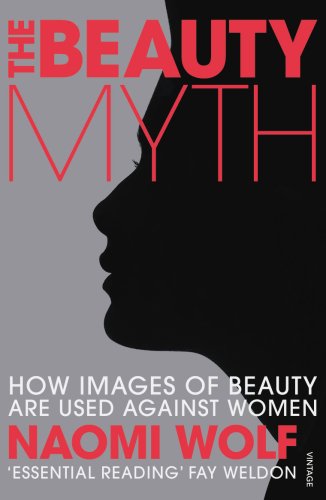
So, this book blew my mind. I realize a lot of stuff in it is kind of dated (it was first published in 1991), and sometimes Naomi Wolf gets a little bit dramatic with her descriptions, but still. It's one of those things where I had some ideas about some of the things she talks about (everything from shaving to age to plastic surgery and in between) but this kind of threw all the facts connected to those ideas in my face. It pushed me to reevaluate my own beauty regimes, thinking about them in terms of what they take up financially and time-wise, and question all of them and why I participated in them. Was it all really for me or was it for everyone else?(and then I stopped shaving). One of the most shocking parts to me was the part about dieting where it basically lists off calorie counts for a bunch of popular diets and then compares then to the calorie intake of that of a starving person in a third world country - and they're pretty much all the same numbers.
The book is broken up into sections: work, culture, religion, sex, hunger and violence. Work delves into multiple court cases wherein women have been fired/harassed/basically whatever other bullshit you can think of for being too pretty, too ugly, too scantily clad, too modestly clad, etc. Basically highlighting that women have been given little to no options when comes to how to "dress for success". Culture expands on this idea of damned if you do and damned if you don't along with introducing the idea of Beauty Porn. Religion and sex of course goes further into the idea of everyone but women controlling women's bodies. Hunger mainly deals with diet culture and violence mainly with plastic surgery.
In a lot of ways this book to me was reminiscent of Backlash by Susan Faludi. It's kind of a thorough look at what the mass media tells us, what that means, what is the truth, and how everything looks if you try stepping back and looking at things logically. Pretty fucked up.
This is a little off topic but makes sense, I was talking with my friend about why in general, drag queens made more sense to us then drag kings. Drag in a lot of ways is playing up the absurdities of gender, and the way society wants women to portray themselves is not only completely absurd but totally alien, therefore it's easier to push these already absurd beauty regimes even further. A lot of this book was basically peeling apart different aspects of what female beauty is supposed to be in order to reveal how bizarre and a lot of times destructive it is.
So, though it was real depressing and kind of dated, it's had a pretty big impact on how I think about the idea of beauty and what it means.

